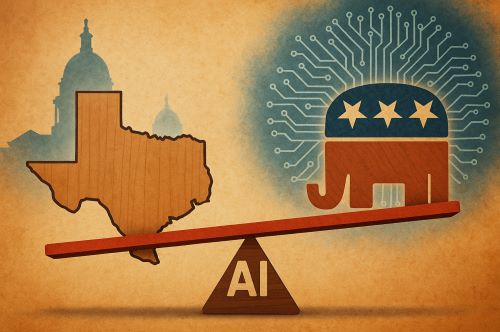

If anything, the urgency of AI demands more democratic input, not less.

By Matthew A. McIntosh
Public Historian
Brewminate
Introduction: A New Federal Frontier
For decades, the Republican Party has draped itself in the mantle of states’ rights — the conviction that power should remain as close to the people as possible, with Washington’s reach strictly curtailed. Whether resisting federal environmental standards, gun control measures, or pandemic mandates, GOP lawmakers have consistently styled themselves as defenders of local autonomy. Yet as the United States enters the age of artificial intelligence governance, this guiding principle seems to be melting in the heat of tech industry influence and ideological expediency.
Leading the charge is Senator Ted Cruz of Texas, who, along with several Republican colleagues, is now pushing measures to prevent individual states from regulating AI. These tactics range from proposed preemption laws to threats of withholding federal funding from states that dare to establish independent AI frameworks. The contradiction is stark: a party that once cried foul at every sign of federal overreach is now engineering it.
Here I examine that contradiction — its political origins, legislative mechanisms, philosophical implications, and the deeper question: what happens to states’ rights when Big Tech enters the room?
The Emerging Patchwork: Why States Are Moving First on AI
In the absence of sweeping federal regulation, states have become the de facto laboratories for AI governance. Much like with data privacy and consumer protection, California has taken the lead, drafting legislation to regulate algorithmic transparency, biometric data use, and automated decision-making in sectors like healthcare and law enforcement.
Other states — New York, Illinois, and Massachusetts among them — are actively considering their own frameworks. Many of these proposals include:
- Disclosure requirements for companies using generative AI
- Bias audits of hiring and credit algorithms
- Moratoriums on facial recognition by law enforcement
- Rules around deepfakes and political disinformation
This state-level momentum echoes how the U.S. first tackled issues like workplace safety, civil rights enforcement, and environmental protections — bottom-up, not top-down.
The Cruz Doctrine: Federal Supremacy, But Only Sometimes
In recent months, Ted Cruz and other Republican senators have introduced or endorsed efforts to stifle this state-driven approach. Their arguments fall along a few predictable lines:
- That interstate commerce would be disrupted by a patchwork of state laws
- That innovation could be stifled by overregulation
- That national security requires centralized AI oversight
In a Senate Commerce Committee hearing this past spring, Cruz warned that “we cannot allow 50 different standards for something as foundational as artificial intelligence.” His favored solution? A single federal regulatory framework — one that, so far, is heavy on voluntary industry standards and light on enforceable consumer protections.
To enforce this approach, some Republican lawmakers have floated legislation that would preempt state laws, while others have gone further, proposing to deny federal research grants or tech development funds to states that enact AI rules “inconsistent with federal policy.”
The Irony and Its Ideological Roots
This is more than a policy debate — it’s a profound ideological inversion.
The modern GOP’s invocation of “states’ rights” dates back to its Southern Strategy in the 1960s, when opposing federal civil rights enforcement was repackaged as defending local autonomy. Since then, the principle has been deployed to resist federal mandates on everything from education standards to marijuana legalization.
Yet the party has always practiced a selective federalism — using states’ rights as a shield when convenient, and federal supremacy as a sword when advantageous. One need look no further than:
- Federal bans on abortion pill access post-Dobbs, pushed by GOP senators over state objection
- Efforts to block sanctuary city policies by cutting federal funding
- Attempts to override California auto emissions standards
In this context, Cruz’s anti-state AI campaign is not a deviation, but an extension of a long-standing tactic: invoke decentralization to resist progressive policy, centralize power to protect corporate interests.
Cui Bono? The Role of Industry Influence
Tech giants — Google, Meta, Amazon, Microsoft — have a vested interest in uniform, minimal regulation. A fractured legal landscape raises compliance costs and complicates product development. Naturally, these companies have lobbied aggressively for federal preemption of state AI laws.
Many Republican lawmakers receive significant political contributions from the tech sector, including Cruz himself. But the relationship is not just transactional — it’s ideological. The vision is one of market-led innovation, free from the “burden” of fragmented democratic oversight.
In this light, the suppression of state regulation is not a betrayal of principle, but the latest expression of techno-libertarian orthodoxy: let innovation flourish, even if it means trampling the very local control that the GOP once championed.
What’s Really at Stake
Democratic Experimentation
State-level regulation offers a sandbox for trying out different AI safeguards. Blocking it kills innovation — not in tech, but in governance.
Cultural and Political Self-Determination
California and Texas have radically different views on civil liberties, data privacy, and corporate accountability. Why should they be shackled to a federal lowest common denominator?
Checks and Balances
In a time when Congress is gridlocked and lobbyist influence is sky-high, states may be the only remaining venues for responsive, citizen-driven policy.
Public Trust
Americans are already wary of AI. Seeing their local representatives blocked from protecting them — in the name of protecting companies — only deepens that distrust.
Conclusion: A False Choice
Republicans like Ted Cruz would have us believe that the only alternatives are federal preemption or chaos — a Balkanized internet stifled by 50 contradictory AI laws. But this is a false choice. We’ve long lived with diverse state-level rules for consumer protection, education, insurance, and criminal justice — all of which deal with technologies just as impactful as AI.
If anything, the urgency of AI demands more democratic input, not less. That means empowering cities, states, and communities to experiment, respond, and lead.
In trying to silence those efforts, Cruz and his allies are not defending American innovation. They are defending corporate impunity — at the expense of both privacy and principle. And in doing so, they have revealed what “states’ rights” has always meant when deployed selectively: a talking point, not a conviction.
Originally published by Brewminate, 06.30.2025, under the terms of a Creative Commons Attribution-NonCommercial-NoDerivatives 4.0 International license.


